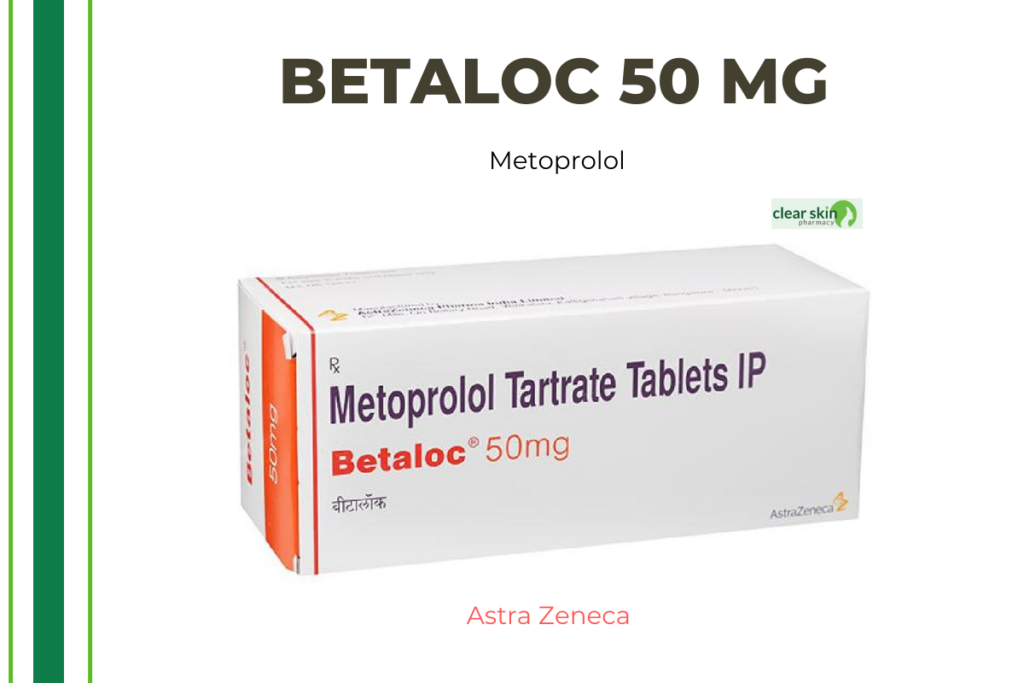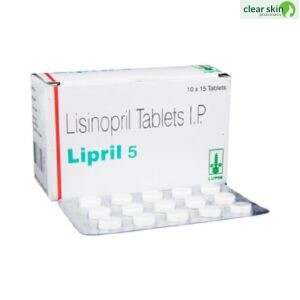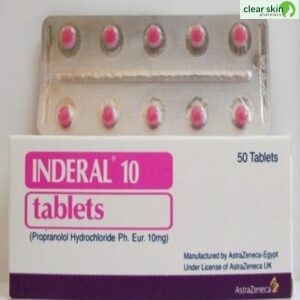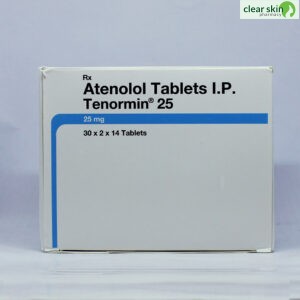Betaloc 50
Betaloc 50 is a beta-blocker used alone or in combination with other drugs to treat high blood pressure (hypertension), chest pain related to the heart (angina), and to protect the heart after a heart attack (myocardial infarction). Additionally, it helps alleviate migraine-related headaches and tremors (fits). High blood pressure increases the cardiovascular system’s burden.
Hypertension, often known as high blood pressure, is a chronic force exerted by the blood on the arteries that can lead to a number of heart complications. Long-term exposure can damage the blood vessels (arteries) of the brain, heart, and kidneys, leading to a stroke, heart failure, or kidney failure. Reducing blood pressure reduces the risk of heart-related stroke, heart attack, and chest discomfort (angina).
By inhibiting the operation of certain naturally occurring substances in the body, Betaloc 50 helps to relax the blood vessels. It reduces the heart rate, making it easier to pump more blood throughout the body. This reduces your blood pressure and your future risk of suffering a stroke, heart attack, or other heart or kidney issues. To be successful, this medication must be used consistently.
Betaloc 50 may be taken orally with or without food, or as directed by a physician. Betaloc 50 should be taken daily at the same time for optimal results. You may have typical side effects such as dizziness or fatigue, cold hands or feet, difficulty sleeping, and nightmares. These side effects are often mild and short-lived. However, if the bad effects persist, visit a physician.
Do not discontinue Betaloc without first consulting your physician. Stopping Betaloc 50 abruptly might cause changes in cardiac rhythm and blood pressure, as well as chest discomfort and a heart attack. To prevent these side effects, your doctor will lower your dosage gradually over time. You should not take Betaloc 50 if you have a very slow heartbeat, asthma, a serious heart condition (sick sinus syndrome), or a heart blockage.
Betaloc 50 should not be given to children less than 12 years old. Before taking Betaloc 50, inform your doctor if you have a muscle disorder (myasthenia gravis, rhabdomyolysis), a breathing problem (COPD, bronchitis, emphysema), low blood sugar (hypoglycemia), low blood pressure (hypotension), depression, previous heart failure, liver/kidney disease, thyroid hormone disorder, adrenal gland cancer, or circulation issues (Raynaud’s syndrome).

Betaloc 50’s Applications
Hypertension (high blood pressure), angina (chest pain due to the heart), arrhythmia (abnormal heart rhythm), and heart attack prevention (myocardial infarction).
Medicinal Advantages
Betaloc 50 inhibits both beta 1 and beta 2 receptors to have its effect. Betaloc 50 blocks the beta 1 receptor, which lowers blood pressure by slowing the heart rate and decreasing the frequency with which the heart pumps blood. By inhibiting beta 2 receptors in the lungs, Betaloc 50 narrows blood channels in skeletal muscle (bronchioles). As a consequence, your general blood pressure decreases, reducing your future chance of having a stroke, heart attack, cardiac issues, or renal issues. Betaloc 50 is used in combination with thiazide diuretics (water pills) and other drugs to treat high blood pressure. Additionally, Betaloc 50 prevents migraines and reduces the symptoms of essential tremor (fits). Betaloc 50 can be used with other thyroid drugs to treat an overactive thyroid by lowering the symptoms of too much thyroid hormone (thyrotoxicosis).
Use Instructions
Betaloc 50 can be taken orally, with or without food, or as directed by a physician. With about a glass of water, completely swallow the pill. It should not be broken, crushed, or eaten. For optimal results, take the drug at the same time daily. Never take an excessive amount to make up for a missing dose.
Storage
Place in a cool, dry area out of direct sunlight.
Betaloc 50 Side Effects
Betaloc 50, like other medications, may have undesirable side effects. However, these side effects may be minor and temporary. Headache, fatigue, sleep disturbances, dry mouth, nausea and vomiting, stomach upset, diarrhea or constipation, abdominal pain, numbness, tingling sensation in the skin, increased sun sensitivity (hyperpigmentation), sweating, hair loss, weight gain, and lower back pain are among the most common side effects. Consult your physician if the bad effects persist or if you experience any new adverse effects while taking Betaloc 50.
Drug Recommendations
Do not stop taking Metoprolol without visiting your physician first. Withdrawal off metoprolol may result in changes in heart rate and blood pressure, as well as chest discomfort and a heart attack. To prevent these side effects, your doctor will lower your dosage gradually over time. You should not take Metoprolol if you have a very slow heartbeat, a serious lung condition (such as asthma), a serious heart condition (such as sick sinus syndrome), or a heart blockage. It should not be administered to children younger than 12 years old. Tell your doctor if you have a muscle disorder (myasthenia gravis, rhabdomyolysis), a breathing disorder (COPD, bronchitis, emphysema), low blood sugar (hypoglycemia), low blood pressure (hypotension), depression, previous heart failure, liver/kidney disease, thyroid hormone disorder (hyperthyroidism), adrenal gland cancer, or a severe blood circulation problem (Raynaud’s syndrome)
Interactions Between Drugs
Metoprolol can produce a dangerous decrease in heart rate when coupled with other blood pressure medicines or beta-blockers, according to drug interactions (acebutolol, atenolol, bisoprolol, carteolol, esmolol, metoprolol, nadolol, nebivolol, or sotalol). Metoprolol should not be taken with other blood pressure medications (lisinopril, enalapril, diltiazem, prazosin, terazosin, doxazosin), asthma medications (theophylline, aminophylline), pain relievers, antifungals (terbinafine), anticancer (aldesleukin), blood thinners (dipyridamole), or antibiotics (rifampin) (amiodarone, propafenone, quinidine, disopyramide, tocainide, procainamide, ajmaline, flecainide, digitalis glycosides such as digoxin, lidocaine). Before using Metoprolol, you should inform your doctor if you are taking any of the following drugs:
Metoprolol has a significant interaction with grapefruit and high-protein meals. Metoprolol’s effects may be diminished when combined with ayurveda, homeopathy, unani, herbal supplements, or any other OTC product. Therefore, at least two hours must elapse between the administration of Metoprolol and the usage of these substances.
Metoprolol is contraindicated in patients with diabetes, thyroid illness, asthma, cardiogenic shock (when the heart fails to pump enough blood to the body), heart valve issues (stenosis), low blood pressure (hypotension), coronary heart disease, liver disease, or heart failure.
Cautionary Note
ALCOHOL
Consuming alcohol can cause fatigue, a reduction in blood pressure, dizziness, and sleepiness. Therefore, if you are on Metoprolol, you should avoid it.
PREGNANCY
Metoprolol is not recommended during pregnancy unless deemed necessary by a physician. Before prescribing it to you, your physician will weigh the benefits and potential risks.
BREAST FEEDING
Metoprolol is present in minute amounts in breast milk. However, this is inadequate to give your infant any issues. However, before to nursing your child, you should contact with your physician.
DRIVING
It is possible to have dizziness, sleepiness, and blurred vision when using Metoprolol. Therefore, driving, using machines, and performing other tasks is discouraged.
LIVER
If you have a history of liver issues, such as jaundice (yellowing of the skin or eyes), dark urine, stomach discomfort, nausea, vomiting, or lack of appetite, you should use metoprolol with caution.
KIDNEY
If you have a history of renal issues, such as an increased creatinine level, use metoprolol with care. Your physician can adjust the dosage if required.
No habits formed
Advice on Diet and Lifestyle
With a BMI between 19.5-24.9, it is possible to maintain a healthy weight.
Perform at least 150 minutes of regular physical activity or exercise every week, or around 30 minutes daily. This can help you reduce your high blood pressure by around 5 mm Hg.
For a nutritious diet, whole grains, fruits, vegetables, and low-fat dairy products are all excellent options.
Optimal sodium chloride (table salt) consumption for most persons is 2300 mg per day or less than 1500 mg per day.
Limit your alcohol consumption to one serving for women and two serves for men.
Stopping smoking is the greatest method to minimize your risk of heart disease.
Chronic stress can elevate blood pressure, therefore you should prevent it. Spending time with and appreciating your loved ones is a stress-reduction and mindfulness approach.
Monitor your blood pressure daily, and if it swings excessively, call your physician immediately.
Include omega 3 fatty acid-rich foods and beverages in your diet on a regular basis. Olive oil, soybean oil, canola oil, and coconut oil are some of the low-fat cooking oils that might help reduce blood pressure.
Recommendations
Because it may induce dizziness, your physician may urge you to take the first dose before night. If you don’t feel dizzy after the initial dose, take metoprolol in the morning. If you use metoprolol more than once a day, try to divide the dosages throughout the day.
Additional Information: This item cannot be returned.
Glossary of Diseases and Conditions
Hypertension, often known as high blood pressure, is a chronic condition in which both the heart’s workload and blood pressure are too elevated. This disease can lead to the development of calcified arteries (blood vessels), which restricts blood and oxygen flow to the heart. Angina (chest discomfort) and heart attack can both be brought on by hypertension (when blood supply to the heart is blocked). High blood pressure may result in brain injury (stroke) and renal failure. One can identify elevated blood pressure with a blood pressure monitor or sphygmomanometer. Systolic pressure is the force exerted as the heart pumps blood out. In contrast, diastolic pressure is the pressure in your heart when it is at rest between heartbeats. If your blood pressure is 140/90 mm Hg, the systolic pressure is 140 mm Hg and the diastolic pressure is 90 mm Hg. The optimal range for blood pressure is between 90/60 mm Hg and 120/80 mm Hg.
FAQs
It is advised that you continue to take your medication even if your blood pressure has stabilized or returned to normal, because a blood pressure rise might occur at any time. Immediately consult a physician if you are experiencing any pain.
Typically, metoprolol is provided over the course of weeks to months to treat heart-related illnesses and disorders. However, long-term use without a doctor’s approval can be fatal. Therefore, take it for as long as your doctor recommends.
Because Metoprolol decreases blood pressure when administered with general anesthesia prior to surgery, your physician may advise you to discontinue usage.
Together, metoprolol and alcoholic drinks should be avoided or used with caution since they might lower blood pressure and produce dizziness or drowsiness.
Due to the fact that Metoprolol may induce a rise in blood potassium levels, potassium-rich meals and supplements should be avoided when taking this medication to prevent adverse side effects.
If you are on Metoprolol, you can still engage in sports, but avoid overexerting yourself. Regular exercise reduces hypertension by preserving the health of the heart and blood arteries. Inform your doctor before undergoing major surgery if you are on Metoprolol. Metoprolol should be discontinued at least one day before to surgery.








Be the first to review “BETALOC 50MG 30 Tablets”